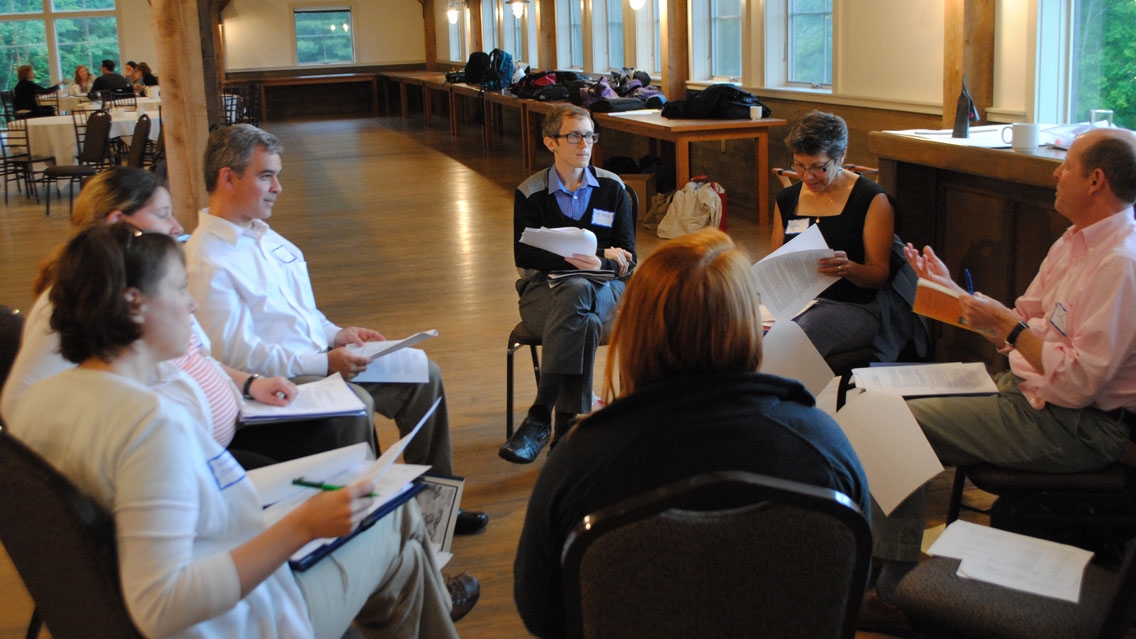Faculty Resources

The Writing and Rhetoric Program supports the teaching of writing by organizing and encouraging faculty conversations about writing across the curriculum, writing within the disciplines, and writing beyond the academy.
In addition to hosting conversations about writing, we create, collect, and share written materials that pertain to the teaching of writing.
Writing and Rhetoric Program faculty are available for individual consultation regarding the teaching of writing (designing assignments, incorporating writing into your syllabus, etc.). To consult with us over email, phone, or to set up a meeting in person, contact any member of the program: Catharine Wright, Hector Vila, James Sanchez, Genie Giaimo, or Shawna Shapiro.
Collaborations of ours you may find useful include Teaching Writing Online and Write Like a Scientist, a teaching website developed by Professor Molly Costanza-Robinson.
Annual Teaching and Writing Retreat

Each August, all Middlebury College faculty are invited to attend the Teaching and Writing Retreat to explore topics in pedagogy, prepare for courses, and explore issues in higher education. You’ll have a chance to plan assignments, fine-tune syllabi, meet colleagues from other divisions, and benefit from other teaching experiences. Presentations and panels introduce approaches to teaching that have proven successful in different disciplines, while small-group discussions give each faculty member a chance to work on particular assignments and syllabi. The annual retreat is organized in collaboration with the Center for Teaching, Learning, and Research.
First-Year Writers and FYS Faculty
The Writing and Rhetoric Program is committed to supporting first-year students in their writing as well as to supporting faculty teaching writing to first-years. Below, learn more about our writing placement model for first-year writers, supplemental writing courses, and other writing support for first-year writers (and faculty).
Directed Self-Placement for First-Year Writers
Following registration for the first-year seminar (FYS), incoming students can expect a placement recommendation from WRPR’s Writing Center director to help inform their course enrollment decisions. This writing placement and advisement model asks students to reflect upon their experiences with academic reading, writing, and research and to report their confidence levels. The placement recommendation will be used in conjunction with FYS advisement to determine if a student is a good candidate for WRPR100/101. First-year seminar faculty will receive information annually on this new model.
In the coming months we plan to provide further information about the directed self-placement model for first-year students and faculty working with first-years.
100-Level Courses
Each fall and spring we offer several classes that first-year students may elect to take if they wish to develop confidence in their writing beyond what the first-year seminar can provide. These courses may be taken in addition to or following the first-year seminar. Second semester first-year students and sophomores are also encouraged to enroll in WRPR100/101.
Additional Writing Support
First-year students and their professors can also find community and support in the teaching and learning of writing through the Writing Center and its course-based writing tutors as well as through professional tutors in the Writing Center.
Faculty working with first-year students are additionally always welcome at workshops and lunches sponsored by WRPR and at the Annual Teaching and Writing Retreat co-organized by the Writing and Rhetoric Program and the Center for Teaching, Learning and Research.
For more information, please contact Writing and Rhetoric Program Director Catharine Wright and Writing Center Director Dr. Genie Giaimo.
Multilingual/ESL Writers
The Writing and Rhetoric Program is available to support faculty in their work with multilingual writers. Below are FAQs and handouts for faculty that provide guidance on teaching and assessing the writing with nonnative speakers of English.
Handouts for Faculty
- Quick reference guide (one page) with teaching suggestions
- Handout from faculty workshop
For more information about these handouts, or about supporting multilingual/ESL writers, please contact Associate Professor of Writing and Linguistics Shawna Shapiro (sshapiro@middlebury.edu).
For individual support for multilingual or international students, please contact Professor Shapiro or Associate Professsor of Writing Hector Vila (hvila@middlebury.edu).
Frequently Asked Multilingual/ESL Questions
How can I most effectively address issues of clarity, language, and/or mechanics?
The best way to support writers with grammar/language concerns is to develop a support model that includes yourself, your peer tutor/mentor (if applicable), and other resources.
- The first step is to talk with the student(s) to learn more about what challenges were faced on the assignment. Did they understand the assignment (and/or the course readings it references)? Did they know what they wanted to say? Did they allocate enough time for completing and reviewing the assignment?
- Keep in mind that in many cases, unclear writing results from confusion about content—not just grammar. In addition, rhetorical strategies differ by language, so what appears “off-topic” or “irrelevant” in one context may not be seen as such in another. Citation and use of sources differ by context as well.
- Once you and the student have considered the various factors which might have impacted the writing process for this assignment, develop a plan for how this assignment might be revised (if possible), and/or how the student might produce clearer work for the next assignment. You may wish to encourage students to make an appointment with one of the CTLR professionals. In addition, all peer mentors/tutors receive training in supporting multilingual/ESL writers, as well as in how to help students with grammar (while still avoiding becoming the de facto editors for student work). Together, we are the authorized aid for student writers.
- Consider giving a separate grade for grammar/style/language use within your evaluation rubric. This allows you to acknowledge strengths in content/argument/organization while still recognizing that some students need to continue to work on the clarity of their writing.
If you have requests or additions for this page, please contact Shawna Shapiro, our multilingual specialist (sshapiro@middlebury.edu) and/or Hector Vila, who also has significant experience with ESL (hvila@middlebury.edu).
How can I set up my course to be inclusive of multilingual/ESL writers?
- Be very explicit about expectations and grading criteria for assignments. Take time to discuss key terms and disciplinary language that are used in assignment prompts and handouts. Give students time to “digest” and clarify what you are asking for. Remember that many of your assumptions about students who have grown up in the U.S. may not apply to international or immigrant students. For example, many multilingual/ESL students did not practice argumentation via the five-paragraph essay. They also may not recognize colloquial vs. scholarly language.
- Encourage multistage writing by requiring that students complete “scaffolding” assignments that build up to the final draft. This may include asking students to submit a thesis, outline, abstract, bibliography, and/or first page for the paper before the draft is due. This also includes encouraging (or requiring) that students get feedback from peers and/or tutors during the writing process.
- Help students prioritize what to work on throughout the process. Thesis formation, overall organization, and use of evidence/sources are usually the most important aspects of early drafts. Students who become too concerned about stylistic or mechanical issues early in the process often miss the big picture.
- Share your own writing strategies (and struggles). As teachers and scholars, we have a good deal of firsthand knowledge about how difficult writing can be. We also know what our strengths and weaknesses are as writers. By sharing this with students, we not only offer insight into the scholarly world, but also ease some of their anxieties about how challenging writing can be.
- Support long-term language growth, rather than short-term fixes. Research into second language acquisition has found that it may take students up to 10 years of academic work in a language to become fully fluent. Even then, there is usually some degree of spoken and written accent.
What other forms of support are available for students?
Although Middlebury does not have an intensive English acquisition or ESL program, CTLR and the Writing Center are committed to providing students who are nonnative speakers of English with support and to helping students connect with other resources throughout the College. Faculty are also provided resources and opportunities through CTLR and the Writing and Rhetoric Program (WRPR) to support their work with multilingual/ESL writers.
For students, CTLR provides these supports:
- Individual sessions with peer and professional tutors who have training in working with multilingual/ESL writers
- Occasional workshops in academic reading, writing, and speaking
For students, WRPR provides these supports:
- First-year seminars designed to appeal to multilingual/ESL writers
- Intensive writing and research courses for first- and second-year students—e.g., Writing in Academic Contexts (WRPR 0100 and WRPR 0101)
For faculty, CTLR provides these supports:
- Embedded course writing tutors who are trained to work with multilingual/ESL writers
- Workshops and other occasional faculty development opportunities
For faculty, WRPR provides these supports:
- One-on-one consultations and handouts about working with multilingual/ESL writers
- Events (lunches, workshops) focused on inclusive writing pedagogy
Writing Library
We have developed a small collection of books about writing and the teaching of writing that can be found in Davis Library, on shelves just outside of the Writing Center/CTLR.
They can also be found on MIDCAT. The books are available to borrow and can be checked out at the circulation desk.
Other books on writing and on diverse pedagogies can be found on the same shelves as part of the CTLR collection. Some texts are by Middlebury faculty (Molly Costanza-Robinson’s Write Like A Chemist and others); all are acclaimed in the field of teaching college writing.
Please feel free to recommend additional texts for our collection. Below are titles of our most recent acquisitions:
- Engaged Writers and Dynamic Disciplines: Research on the Academic Writing Life
- ESL Writers, Second Edition / A Guide for Writing Center Tutors
- Fostering International Student Success in Higher Education
- Moving Critical Literacies Forward: A New Look at Praxis Across Contexts
- Personally Speaking: Experience as Evidence in Academic Discourse
- Reading, Writing, and Thinking: The Postformal Basics
- Scenarios for Teaching Writing: Contexts for Discussion and Reflective Practice
- Several Short Sentences About Writing
- Style: The Basics of Clarity and Grace, 5th Edition
- Cross-Talk in Comp Theory: A Reader, 3rd Edition
- Teaching with Writing
- Situating Portfolios: Four Perspectives
